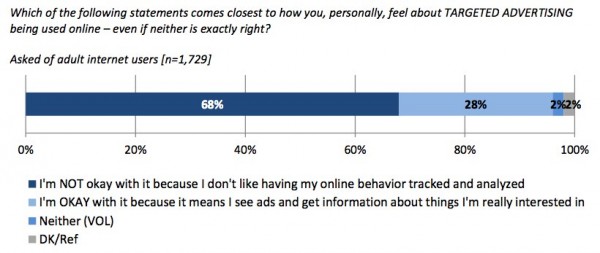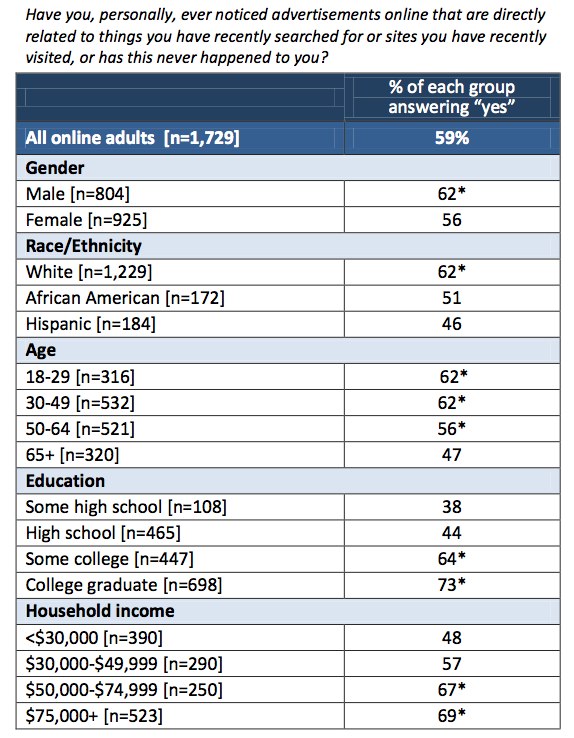Pew Survey: 68% View Targeted Ads Negatively; 59% Have Noticed Targeting
Ads that follow you around the web? Marketers have been putting them to good use. But a new survey finds, perhaps unsurprisingly, that nearly three-quarters of those asked dislike such targeting. And people do notice — nearly two-thirds report experiencing being targeted by ads. The findings are from a new survey by the Pew Internet & […]
 Ads that follow you around the web? Marketers have been putting them to good use. But a new survey finds, perhaps unsurprisingly, that nearly three-quarters of those asked dislike such targeting. And people do notice — nearly two-thirds report experiencing being targeted by ads.
Ads that follow you around the web? Marketers have been putting them to good use. But a new survey finds, perhaps unsurprisingly, that nearly three-quarters of those asked dislike such targeting. And people do notice — nearly two-thirds report experiencing being targeted by ads.
The findings are from a new survey by the Pew Internet & American Life Project. Around 2,000 adults in the US were surveyed between January 20 and February 19 of this year and asked a variety of questions about targeted ads.
Targeted Ads? Not OK
People were asked how they felt about targeted ads:

Rather than a simple yes/no choice, the responses gave some context. From the chart above:
- 68% said they were “not OK” with targeted ads since, as the response continued, “I don’t like having my online behavior tracked and analyzed”
- 28% said they were “OK” because “I see ads and get information about things I’m really interested in”
By Demographic
The survey also broke down responses to the question on targeted ads by age and income level:

In general, the older someone was, the less likely they were to agree with targeted ads. The exception was that those 65 and over dipped a little less on the negative scale compared to 50-64 year-olds. The percentage of those who said it wasn’t OK, by age group:
- 18-29: 59%
- 30-49: 65%
- 50-64: 78%
- 65+: 72%
The same pattern held true by income group. The more you earned, the more you were likely to object to being targeted — except for the very top bracket of earning more than $75,000, which dipped. The percentage of those who weren’t OK:
- Less than $30,000: 58%
- $30,000 to $49,999: 68%
- $50,000 to $74,999: 74%
- $75,000+: 68%
Who Notices Personalized Ads?
On average, 59% of those surveyed said they’d noticed being targeted by ads online that were directly related to things they’d recently searched for or to sites they’d visited:

From the table above, men were slightly more likely to notice targeted ads than women (62% to 56%). Possibly, this means that men are more targeted than women, but it’s impossible to say since the survey is based on impressions.
By age, the younger you are, the more likely you notice targeting. Both the 18-29 and 30-49 age groups had 62% saying they were targeted, with other groups falling off from there.
Also, the more education you have, or the more income you earn, the more likely you are to notice targeting, according to the survey.
False Sense Of Control?
Only 38% of those surveyed said they were “generally aware of ways they themselves can limit how much information about them is collected by a website,” Pew reported. It then asked about strategies that this supposedly savvy group used:

Most people — 81% — said they deleted their web history. They probably meant they cleared the history kept in their web browser. If so, that wouldn’t prevent how targeting — often called remarketing or retargeting — works online. They’d need to clear their browser’s cookies to do that, or make use of online opt-out forms.
The second most popular tactic, used by 75% of those surveyed (you could pick more than one choice), was to use the privacy settings of websites. Potentially, these are people who did use retargeting opt-out options. However, my suspicion is that many of these people probably meant that they just did things like ticking email opt-out options. I could be wrong, however. I’m completely speculating here.
The third and last tactic was changing browser settings, used by 65%. Potentially, that means clearing cookies. Certainly it might mean blocking them, which would provide protection against targeting.
In the survey, Pew did not that clearing cookies wasn’t an option offered. So some who did this may have chosen one of the existing choices.
More From The Survey
We’ll be breaking down different aspects of the complete Pew survey in the coming days. So far, here’s our other coverage:
Contributing authors are invited to create content for MarTech and are chosen for their expertise and contribution to the search community. Our contributors work under the oversight of the editorial staff and contributions are checked for quality and relevance to our readers. MarTech is owned by Semrush. Contributor was not asked to make any direct or indirect mentions of Semrush. The opinions they express are their own.
Related stories